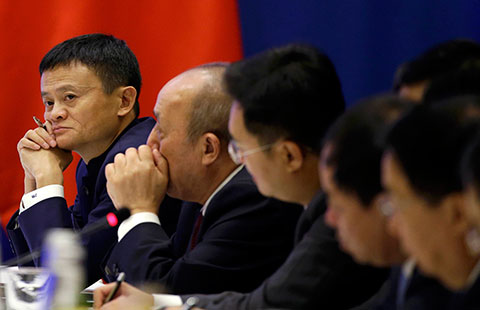Ethnic equality, unity and development in Xinjiang
Updated: 2015-09-25 06:33
(China Daily)
|
||||||||
The Chinese government is fully committed to a policy of freedom of religious belief, respecting its citizens' freedom to believe or not believe in religion. Citizens are equal before the law and must carry out the duties imposed by the Constitution and other laws, whether they believe in or not believe in any religion. Anyone who encroaches on the citizens' freedom of believing in or not believing in any religion shall bear legal liability, and citizens both believing in or not believing in any religion also bear legal liability for breaching the Constitution and the law.
The policy of freedom of religious belief has been fully implemented in Xinjiang. After the founding of Xinjiang Uygur Autonomous Region, people of all ethnic groups are guaranteed the right of freedom in religious belief. It is up to the person concerned to make his or her free decision to believe or not to believe in any religion, to believe in a religion in the past but not now, not to believe any religion in the past but believe one now, to believe in this or that religion and to believe in this or that sect of the same religion. All normal religious activities held by the believers either in religious venues or at their homes in line with customary religious practices are protected by the law, and no state organ, public organization or individual may interfere with such activities.
Xinjiang currently has 24,800 venues for religious activities, including mosques, churches, Buddhist temples and Daoist temples with 29,300 clerical practitioners, basically sufficient to meet the religious believers' needs for normal religious activities. In addition, the region has 112 religious organizations and eight religious colleges. In Xinjiang, 1,436 religious practitioners have been elected deputies to or members of people's congresses and the people's political consultative conferences at various levels. They have actively participated in deliberations and management of administrative affairs on behalf of religious believers, and in exercising supervision over the government in respect to the implementation of the policy of freedom of religious belief. The lawful rights and interests of religious organizations are protected by the law.
Most people of Xinjiang's 10 major ethnic groups are followers of Islam, so there are all together in Xinjiang 24,400 mosques with 28,600 clerical personnel. Since the 1980s, the central government has allocated over RMB10 million to maintaining or repairing a number of key religious sites listed under the protection of the state and the autonomous region, including the Id Kah Mosque in Kashi, Juma Mosque in Hotan, Yang Hang Mosque in Urumqi, and Emin Minaret in Turfan. The Xinjiang Islamic Institute has trained 634 students since its founding in 1987, and since 2001 has held 132 training sessions for 28,665 clerical personnel. Since 2001, in order to train high-caliber clerics, Xinjiang has sent 70 people to visit Islamic institutions of higher-learning in Egypt, Pakistan, Saudi Arabia and other countries for further studies. In accordance with standard international practices, the Chinese government has implemented a policy for planning and organizing pilgrimages. Since the 1980s, more than 50,000 people from Xinjiang have made pilgrimages to Mecca in Saudi Arabia.
The normal requirements of religious believers have been satisfied. The government of the autonomous region has managed to do a better job in the religion-related work in view of the actual conditions of the various religions; it has shown full respect to citizens' right of freedom of religious beliefs and has kept opening up new legitimate channels for religious believers to correctly understand the ABC of the various religions, thus basically satisfying the reasonable requirements of the religious believers. By 2014, more than 1.76 million copies of religious classics, books, and magazines had been published, including the Quran, Selections from Al-Sahih Muhammad Ibn-Ismail al-Bukhari and Selected Works of Waez in Uygur, Kazak, Han Chinese and Kirgiz languages, the "New Collections of Waez's Speeches" series in Uygur, Kazak and Han Chinese languages, and the magazine China's Muslims. In 2013, the new Uygur edition of the Quran was published and 230,000 copies were sold. By 2014, the number of Islamic publications available in Xinjiang's ethnic minority languages exceeded 20, which basically satisfies Muslims' demands to learn about the Islam and Islamic scriptures.
Xinjiang has strengthened management of religious affairs in accordance with the law. The state and the autonomous region, following the basic principles of "protecting the lawful, banning the unlawful, holding in check the extremist, resisting infiltration and punishing crime," exercise management of religious affairs, protect the freedom of religious beliefs and ensure the orderly holding of normal religious activities and protect the legitimate rights and interests of religious organizations in accordance with the law and relevant regulations. The re-amended Regulations of Xinjiang Uygur Autonomous Region on Religious Affairs were issued in 2014, indicating further implementation of the basic policy of protecting the citizens' freedom of religious belief as prescribed in the Constitution, in addition to emphasizing that religious activities must be carried out within the boundaries prescribed by the law and relevant regulations and that activities that harm national security and interests, public interests and the citizens' legitimate rights and interests in the name of religion must be banned.
Religious extremism has been firmly curbed in accordance with the law. Religious extremists advocate extreme ideas, incite religious hatred and resentment against other religions and "heretics," undermine Xinjiang's religious harmony and ethnic unity, deny the traditional Islam in Xinjiang, cause damage to its internal harmony and jeopardize the fundamental interests of Muslims. Extremist ideas distort and contravene Islamic theology, and the extremists bewitch Muslims, especially teenagers, with such heretical ideas as "the shahid (martyr) engaged in jihad (holy war) can live in the garden of Paradise," thus turning some individuals into extremists and terrorists whose thoughts are controlled and who are manipulated to frequently perform acts of violence and terrorism and kill innocent people of all ethnic groups, even their fellow Islamic clerics and Muslims. Many facts have revealed that religious extremism has developed into a real risk that has endangered national and ethnic unity, undermines religious and social harmony, menaces Xinjiang's lasting social stability and threatens the life and property safety of people of all ethnic groups. Suppressing religious extremism in accordance with the law is a just move that protects the fundamental interests of the state and the people, including Muslims themselves, and is also an important part of the international response to religious extremism. The autonomous region has always pursued the policy of freedom of religious belief, protected normal religious activities, worked hard against extremism in ensuring the life safety of the people, and effectively prevented spreading of religious extremism.
- Another corruption suspect repatriated from US to China
- Shanghai slaps three-year ban on entertainers caught doing drugs
- 37 students critical after botched fire drill in NW China
- Man writes Chinese calligraphy using kitchenware
- Brilliant Autumn Urumqi feasting many eyes
- Kids serve as traffic police in C China
- Colombia, FARC reach breakthrough agreement in Havana
- White House prepares for government shutdown
- EU leaders seek unity on refugee plans
- EU pushes through plan to relocate 120,000 refugees amid oppositions
- China, Malaysia conclude first joint military exercise
- Hillary Clinton opposes controversial oil pipeline

 Here's what's on the menu for the state dinner
Here's what's on the menu for the state dinner
 President Xi visits Microsoft campus in Seattle
President Xi visits Microsoft campus in Seattle-
 Xi revisits Lincoln High School after 1993 bond
Xi revisits Lincoln High School after 1993 bond 
 Chinese, US business leaders gather at roundtable meeting
Chinese, US business leaders gather at roundtable meeting-
 Xi visits assembly line of plane manufacturer Boeing in US
Xi visits assembly line of plane manufacturer Boeing in US -
 First Lady tours Fred Hutchson Cancer Research Center
First Lady tours Fred Hutchson Cancer Research Center 
 Boeing to sell 300 planes to China
Boeing to sell 300 planes to China-
 Sino-US ties need more understanding: Xi
Sino-US ties need more understanding: Xi
Most Viewed
Editor's Picks

|

|

|

|

|

|
Today's Top News
Young people from US look forward to Xi's state visit: Survey
US to accept more refugees than planned
Li calls on State-owned firms to tap more global markets
Apple's iOS App Store suffers first major attack
Japan enacts new security laws to overturn postwar pacifism
Court catalogs schools' violent crimes
'Beauty of Beijing's alleys akin to a wise, old person'
China makes progress fighting domestic, international cyber crime
US Weekly

|

|







